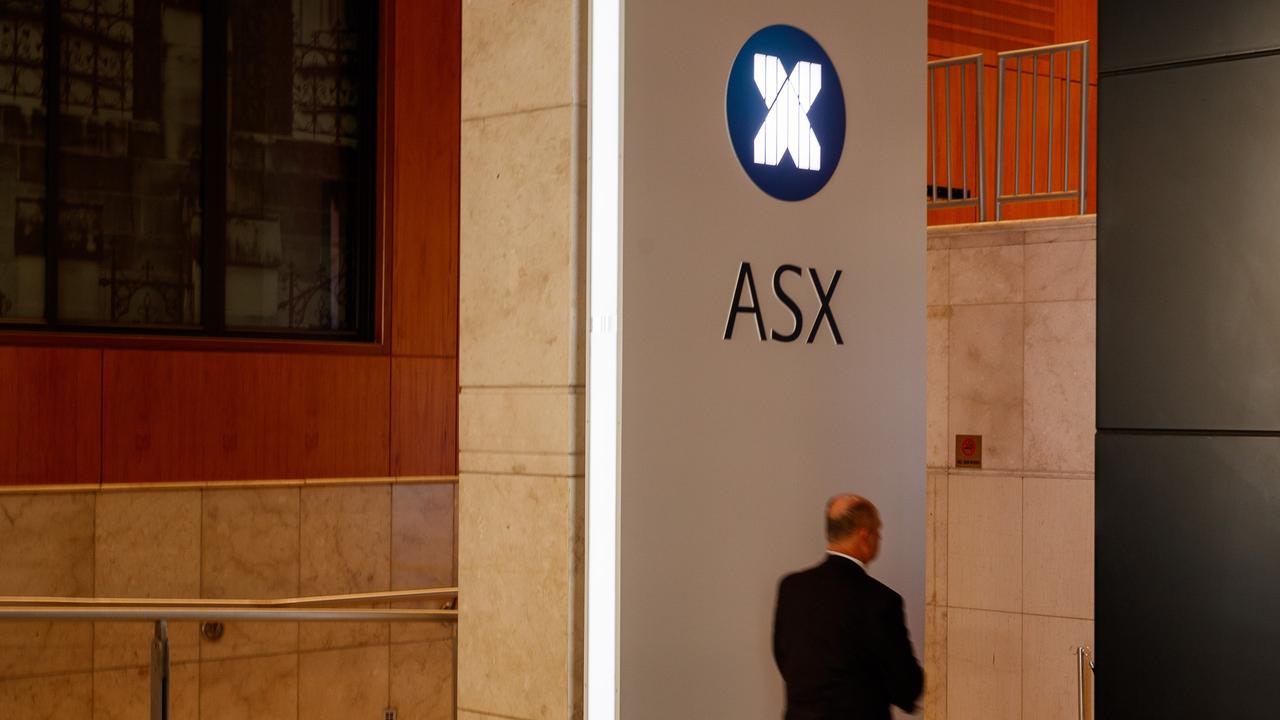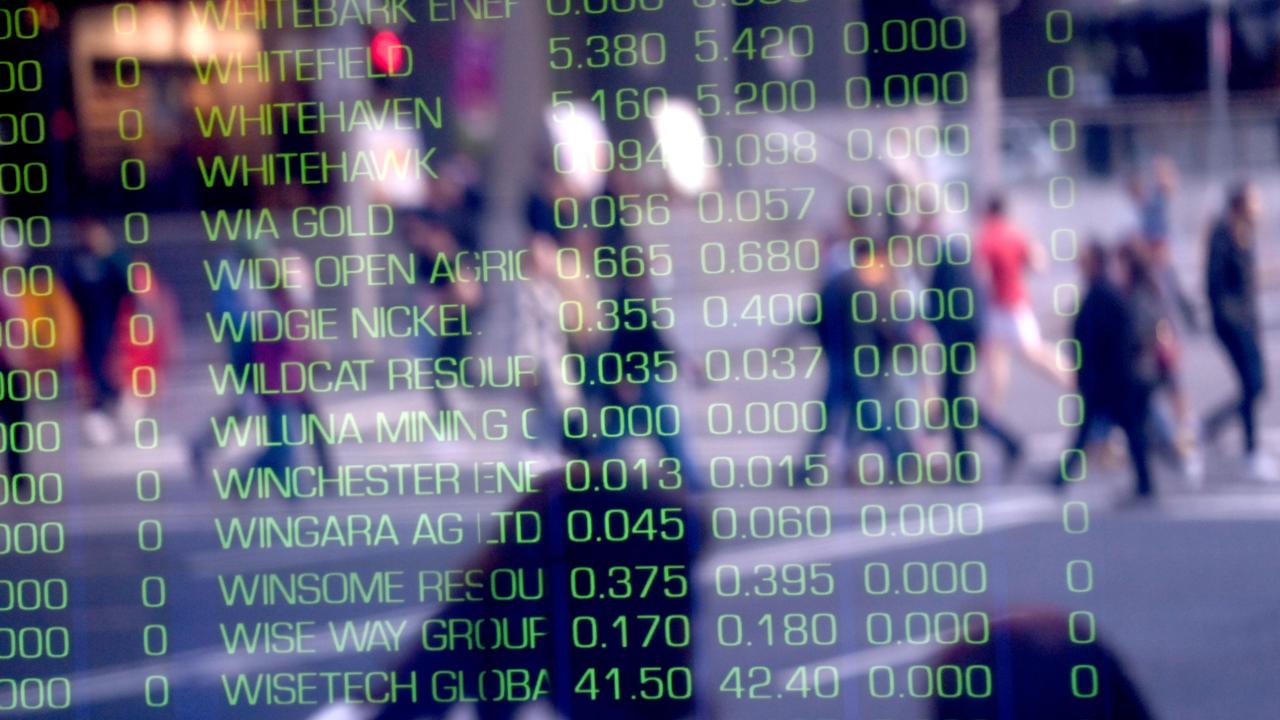S&P/ASX 200 lower as Challenger, Boral dive. Crown licence blow, Macquarie gains
Australia’s sharemarket fell for the first time in three days as Challenger and Boral dived and banks retreated before CBA’s results. Crown suffers huge NSW inquiry blow.
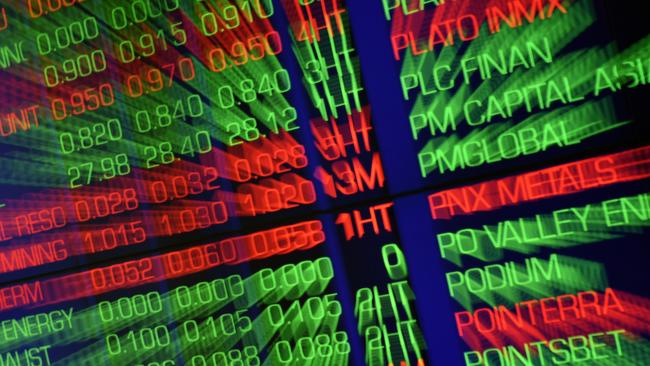
- Macquarie profit to fall, executives depart
- Cautious Suncorp lifts cash profit 40pc
- Bitcoin hits record after Tesla investment
Welcome to the Trading Day blog for Tuesday, February 9. Australia’s sharemarket fell for the first time in three days as investors digested earnings reports, even as US stocks posted new records. But Macquarie and Suncorp were higher after a trading update and earnings report respectively, while Challenger and Boral dropped after their reports disappointed the market. Crown Resorts remains in a trading halt pending its response to a regulatory inquiry that recommended it be denied a Sydney casino licence.
8.33pm: Honda profit surge
Honda said on Tuesday that net profit more than doubled in the third quarter and revised up its full-year forecast as the global auto industry shows signs of recovery.
The Japanese firm’s net profit in the three months to December came to 284.1 billion yen ($2.7 billion), up from 116.4 billion yen for the same period a year earlier.
The profit gain was mainly down to “increased efficiency of R&D expenditures and cost reduction efforts”, Honda said.
The coronavirus pandemic has taken a heavy toll on the global auto sector, but demand recovered swiftly in the second half of last year, notably in the United States and China.
Honda, which revised its annual forecasts up last quarter, further upgraded its net profit outlook to 465 billion yen for the fiscal year to March, up from its earlier estimate of 390 billion yen.
AFP
6.44pm: Big profit drop for Total
French energy giant Total reported Tuesday a 2020 net loss of $7.2bn, compared with a profit of $11.2 bn the previous year, as the coronavirus pandemic slashed demand.
The company, which was to change its name to TotalEnergies to reflect a move away from fossil fuels, said its adjusted net profit - which excludes exceptional and one-off items -- plunged 66 per cent in 2020 to just over $4.0bn.
AFP
Bridget Carter 6.28pm: Packer blocktrade beckons
A $2bn block trade could be launched within days in the Australian equities market following the findings of an inquiry into Crown Resorts, sources say.
On Tuesday, the commissioner of an inquiry into Crown Resorts advised the NSW government to force James Packer to sell down his 36.7 per cent stake in the casino company, which is worth about $2.5bn.
Read more: Bankers test interest in Packer’s stake as block trade looms
4.29pm: ASX falls as earnings arrive
Australia’s sharemarket fell for the first time in three days as investors digested earnings reports.
The S&P/ASX 200 index fell 0.9pc to a two-day low of 6821.2 despite fresh record highs on Wall Street overnight.
Challenger and Boral fell 15pc and 7.4pc respectively after their earnings reports.
Crown Resorts was halted pending its response to a report from Liquor & Gaming NSW, which found the casino operator needs a board restructure to hold its Sydney license.
Suncorp and James Hardie finished up 2.8pc and 1pc respectively after opening up 6.4pc and 7.1pc respectively after their earnings reports.
Major banks fell 1.3-1.9pc before CBA’s results on Wednesday.
Ben Wilmot 4.20pm: Local shopping lifts SCA
Supermarket and shopping centre owner SCA Property Group has unveiled a lift in first half profits and showed it is on the recovery path by outlining plans to restore earnings.
The trust is capitalising on the swing towards supermarket-based property and has the firepower to make another $250m worth of acquisitions.
Chief executive Anthony Mellowes said that throughout the COVID-19 pandemic, the company‘s convenience-based centres had benefited from the shift to shopping locally, as it turned in a 14.1 per cent lift in profit to $102.9m.
Lachlan Moffet Gray 4.10pm: Massive blow for Crown NSW casino
The commissioner of an inquiry into whether James Packer’s Crown Resorts has recommended to the NSW government that the company is not suitable to operate its $2.2bn Barangaroo Casino and has advised the government to force him to sell down his 36.7 per cent stake in the company unless he receives government approval from a new casino regulatory body.
Commissioner Patricia Bergin in the report said “it is recommended that the Casino Control Act be amended to provide that a person may not acquire, hold or transfer an interest of 10 per cent or more in a Licensee of a casino in New South Wales or any holding company of a Licensee without the prior approval of the ICC.”
The ICC - or the Independent Casino Control Commision - is the name of a new regulatory body for casinos that Ms Bergin said should be established via legislation to act as a “dedicated, stand-alone, specialist casino regulator” with the powers of a standing Royal Commission.
Ms Bergin also recommended that each casino in the state should be barred from dealing with gambling promoters - or junkets - and should have an ICC approved auditor perform annual compliance reports.
Read more: Packer loses Sydney casino: Crown ‘not suitable’ for licence
Eli Greenblat 3.21pm: H&M ‘to close 7 stores’ across Australia
Global Swedish department store H&M is looking to close up to seven of its stores in Australia to trim its store count here by around 15 per cent as the retailer battles tough economic conditions for fashion and aims to shift customers to its newly launched online platform.
One H&M store in Chatswood, in Sydney’s north, has already been closed with fears that more are to follow.
The decision by H&M to slim down its footprint in Australia brings to an end a rapid and aggressive expansion of the Swedish retail chain here which kicked off with its maiden store in Melbourne in 2014 and which was greeted by 15,000 customers surging through the store on its first open day.
The Swedish retailer and world’s second-biggest fashion chain, popular for its private label fashions, quickly expanded to have 49 stores in Australia but now up to seven could close including a key site in Bondi, Sydney.
Retail industry insiders suggested the H&M stores staring down the barrel of being closed include Bondi Junction (NSW), Kotara (Newcastle, NSW), Chirnside (VIC), Warringah Mall (NSW), Townsville (QLD) and Rockhampton (QLD). The seventh store in Chatswood, NSW, closed in January.
A spokeswoman for H&M declined to comment on the store closures.
3.02pm: $A above US77c as commodities gain: CBA
The Australian dollar is 0.34pc stronger against the US dollar this afternoon at around US77.28c.
Commonwealth Bank’s Global Markets Research team says: “AUD/USD lifted back above 0.77 because of the weaker USD, and higher commodity and equity prices.
“The signal from the bond market also supports a higher AUD. Yields on a range of government bonds have been rising in recent weeks. The higher yields are consistent with market participants pricing in a stronger global economic outlook.
“And the stronger economic outlook supports commodity prices and the ‘reach for yield’ in markets outside of the US safe‑haven.”
2.51pm: Mortgage stress to ‘test’ property sector: Roy Morgan
Michele Levine, chief executive Roy Morgan, says levels of mortgage stress in Australia plunged during 2020 but the winding back of support from the federal government and banking and financial institutions this year is a test for the property sector.
“The latest Roy Morgan data into the Australian housing market shows mortgage stress continued to track near record lows in the three months to November 2020. There were 783,000 mortgage holders considered ‘At Risk’, unchanged on a year earlier and 454,000 considered ‘Extremely At Risk’ – down on late 2019, and well below the level at the start of the COVID-19 pandemic (559,000).
“However, as we head into 2021, the significant support provided by the federal government as well as banking and financial institutions, is gradually being wound back. Both the JobKeeper wage subsidy and JobSeeker Covid-19 supplement are due to expire at the end of March and ‘loan holidays’ provided to mortgage holders in financial stress are also being progressively ended.
“According to the Australian Prudential Regulation Authority (APRA), banks have deferred payments on housing loans valued at $43bn at the end of December 2020. This is down significantly from the value of deferred loans in August 2020 of $160bn and represents 2.4% of all housing loans.
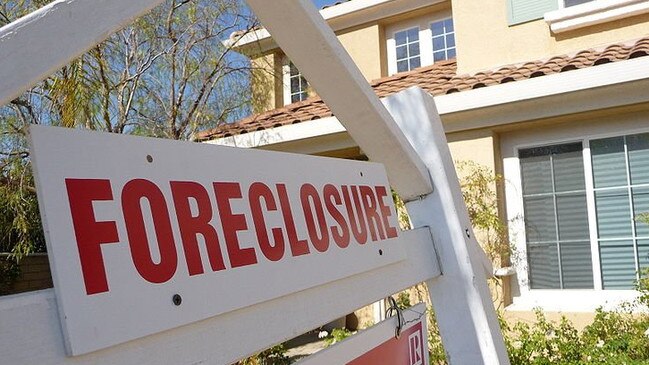
“APRA figures show that those holding loans with a loan-to-value ratio above 90% were significantly more likely to take up a repayment deferral. These loans make up 6% of all housing loans, but 10% of deferred loans.
“The ending of the JobKeeper wage subsidy later next month will put added pressure on up to 1.5 million jobs that were relying on the payment in the December quarter 2020 according to the Australian Treasury. That is a huge pool of employees who potentially face a substantial drop in income over the next few months that is set to lead to an increase in mortgage holders falling into an at risk category.”
READ MORE: The new risk for property investors
John Durie 2.22pm: Missing the good news on Challenger
Challenger boss Richard Howes delivered a result which missed market expectations by a whisker yet his stock price was slammed down 12.5 per cent at $6.32 in early trade.
Granted, it has run some 35 per cent ahead of the market since the investment management company’s full year result and in some quarters there were hopes of an upgrade to full year forecasts, but the actual numbers released were pretty much in line with estimates.
One day’s trade doesn’t set the rule book but on the surface it was an extraordinary over-reaction to what was in most respects a solid result.
Shares are down as much as 14.4pc this afternoon.
Bridget Carter 2.04pm: Affinity Education fields approaches
Childcare operator Affinity Education is understood to have fielded acquisition proposals from industry rivals in recent weeks, fuelling speculation that its private equity owners may soon place the business back up for sale.
Affinity was on the market in 2018, but the sale was suspended when offers fell short of expectations by owner Anchorage Capital.
However conditions in the childcare industry are now said to be booming for some companies.
1.51pm: Business conditions correction ‘warranted’: CommSec
The December business survey was a little too good to be true, says CommSec chief economist Craig James, with operating conditions reportedly the best in over two years.
“So some correction and consolidation was warranted. And that’s what the January survey has delivered.
“Importantly though, both business operating conditions and confidence levels are above longer-term averages. And these averages incorporate lows over the past 24 years such as the global financial crisis and highs such as the mining boom. So to be emerging from a pandemic with above-average results for the business sector is encouraging.
“Note that business is still not keen to take on debt. Around 60 per cent of businesses say that no borrowing is required,” says James.
“Courtesy of government and central bank stimulus, both sentiment and business conditions are strongest in the retail sector.”
Bridget Carter 1.37pm: Bankers seeking Worley interest
Equity capital markets bankers are understood to have been calling fund managers in recent days, gauging their interest in buying a $567.6m block of shares in Australian listed engineering firm Worley.
It comes with speculation mounting that Jacobs may be about to stage an exit from its 9.84 per cent stake in Worley, currently valued at $567.6 million, after signalling that non-core asset sales were on its agenda.
Jacobs made an acquisition late last year of a major stake in PA Consulting, valuing the company at STG1.825bn, and there are suggestions that the global consulting firm Jacobs could be keen to sell its non-core stake in the $5.77bn Worley to help fund the transaction.
Jacobs gained the stake after the Australian listed Worley embarked on a $4.6bn acquisition of Jacobs’ engineering and construction division in 2018.
This diluted the 26 per cent stake held by Dar Group to just under 23 per cent.
With enough demand from investors, the thinking is that opportunistic ECM bankers could approach Jacobs with a proposal to offload the interest.
Some prospective investors in the market say that they would expect a discount of about 8 per cent on the stock before they would be a keen acquirer in a block trade.
Globally, Jacobs Engineering has recently announced a plan to sell non-core assets.
Richard Gluyas 1.10pm: Challenger ‘turns a corner’; shares drop 13pc
Challenger has “really turned a corner” after a period of significant pandemic-induced disruption, with strong growth in funds management and growing momentum in its life business, according to chief executive Richard Howes.
Announcing a normalised pre-tax profit of $196m for the December half-year, Mr Howes said the group was on track to achieve $390m to $440m in full-year earnings, with growth in the second-half to be supported by deployment of about $1bn in excess cash and liquids.
“Our strategy of diversifying revenue is working with strong book growth in our life business and industry-leading organic flows in funds management,” he said.
“We remain strongly capitalised with prudent portfolio settings which are appropriate given our growing customer franchise.
“The investment portfolio is in good shape, with no significant credit defaults and stable property valuations during the half-year.”
Challenger declared a fully-franked interim dividend of 9.5c, down 8c from a year ago, after prioritising preservation of capital and electing not to declare a final dividend in 2020.
Macquarie Research saw the result as “slightly weak” - about 1 per cent less than consensus estimates for normalised pre-tax profit.
Profit guidance, however, was unchanged.
“We continue to like the long-term growth thematic, coupled with the capital benefits of the acquisition of the bank licence, although valuation is becoming challenging,” Macquarie said.
The result equated to a statutory net profit of $222.8m, up 1 per cent from $220.4m a year ago.
Shares have dived today, down as much as 13pc to $6.26 by the afternoon session.
12.52pm: Cochlear to report strong recovery: JPM
Cochlear is set to report a strong earnings recovery in its 1H21 results Friday week, according to JPM.
The broker has upgraded its rating on the hearing implant maker to Neutral and raised its target price 8.5pc to $200.
“After an encouraging Q1 update and recent positive feedback from the US we are confident Cochlear will report a strong earnings recovery, supported by share gains and flat operating costs,” says JPM analyst David Low.
But with the share price “appearing fully valued”, he can’t justify an Overweight rating.
He notes that implant volumes have recovered, in some cases to pre-pandemic levels, in the US, and argues that other developed markets are likely following a similar trajectory.
“This may slow with the lift in infections but the impact on outpatient surgeries (such as cochlear implants) should be limited,” he says.
And while upgrades have been less of a priority during the pandemic leading to a double-digit decline in the first half, he expects this to improve in the second half with the success of the Kanso II processor and the normalisation of conditions.
“We do not expect management to provide guidance but we will be looking for increased clarity on the impact of the recent rise in COVID-19 cases and any signs of improvement in emerging markets,” Mr Low says.
“Reduced hedging will see an FX headwind in FY21 given the strong Australian dollar (but) we expect this to moderate as the group rebuilds its hedging.”
COH last up 0.3pc at $207.14.
Lilly Vitorovich 12.45pm: Aus Open first night session disastrous for Nine
The first night of the delayed Australian Open was disastrous for television broadcaster Nine Network with its audience down by nearly a quarter from last year.
The night session, which kicked-off with tennis bad boy Nick Kyrgios, attracted a national average audience of 653,000, down 24 per cent from 864,000 last year.
Its audience across the five metropolitan cities, which is closely watched by advertisers, was down 23 per cent to 486,000 from 634,000 a year earlier.
That’s in stark contrast to the Australian Open’s first night session last year on January 20, with Nine at the time boasting its metro audience was up more than 17 per cent from 540,000 in 2019.
Still, Nine is pleased with the audience numbers for the Kyrgios match against Frederico Ferreira Silva, which attracted a national and metro audience of 797,000 and 605,000, respectively, on its primary channel.
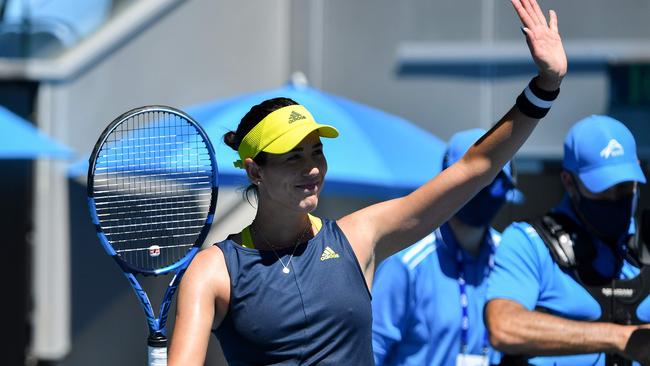
12.38pm: Boral result should see upgrades: Citi
Boral’s 1H21 result was “solid” and should lead to upgrades of consensus estimates given a stronger North America market and a positive tone on the outlook for that market in 2021, according to Citi.
Underlying EBITDA fell 1pc to $486 million as better results in North America were offset by weaker performance in Australia.
Core NPAT of $156 million was 10pc ahead of Citi forecasts $142 million, and while there was no interim dividend, net debt fell.
Citi sees Boral’s cost cutting, strong US result and the rebound in USG as positives.
Negatives include weak Australian revenue and declining Fly ash volumes, but Citi sees upgrade risk for Boral’s Australian operations over time.
BLD last flat at $5.41.
12.14pm: ASX -0.8pc amid mixed earnings news
Australia’s sharemarket was heading for its biggest fall in three days after reacting to corporate earnings news.
The S&P/ASX 200 was down 0.8pc at 6830.5 after rising 0.1pc then falling as much as 0.5pc on relatively light volume.
After bouncing almost 6pc from a 2-month low of 6517.2 to an 11-month high of 6901 early this month the market was weighed down by falls in all sectors apart from Technology and Energy.
Challenger dived 13pc after its earnings report missed expectations and major banks were down 1.3-1.6pc.
CSL lost 0.7pc, Wesfarmers lost 1.3pc, Woolworths fell 1.2pc, Goodman fell 2pc and Tabcorp lost 3.8pc while Crown trading was halted pending a statement after a report from the NSW gaming regulator.
The falls were partly offset by a 6.5pc rise in Macquarie after its earnings guidance implied a much stronger-than-expected result.
12.00pm: BikeExchange debuts on ASX
BikeExchange (ASX: BEX) began trading on the ASX this morning opening at 29c and hitting a high of 32c before dropping lower to trade at 28c by midday.
The business, described as carsales.com.au for all things cycling, was aiming to raise $20m with a 26c share offering on the back of raising the same amount through a pre-IPO round.
In an interview with The Australian, Sam Salter’s journey to bring his company to a stock market listing has been like a long, grinding uphill climb.
Fourteen years after Salter launched BikeExchange with business partner Jason Wyatt, the online marketplace geared up to launch its initial public offering.
READ MORE: BikeExchange’s journey to stock market listing a long climb
11.30am: Business conditions ease; confidence up: NAB
Australian business confidence and conditions were both above long-term average levels last month even as conditions eased from a multiyear high after a very strong final two months of the year.
Business conditions fell to 7 points in January from 16 points in December, while business confidence rose to 10 points from 7 points, according to NAB’s Monthly Business Survey.
Businesses reported that trading conditions had pulled back to around long-run average levels after a very strong November and December, while profitability and employment also pulled back, albeit both were above their historic averages, said NAB chief economist Alan Oster.
A recovery in business conditions and confidence from record lows in March and April came as central banks and government’s unleashed unprecedented fiscal and monetary policy stimulus, with the business outlook also getting a further boost after the federal budget announced world-leading fiscal stimulus in October and the Reserve Bank followed that by cutting its policy interest rates to a record low of 0.1 per cent and starting a quantitative easing program that has since been extended.
Mr Oster noted that a divergence in conditions across industries continued to track as expected, with retail and wholesale still strong, but recreation and personal services continuing to lag.
“This is also consistent with confidence that is slightly higher in services pointing to expectations of further recovery there,” Mr Oster said.
“Elsewhere, key indicators of the level of activity recovered – capacity utilisation and capex – made modest gains, where both are just a little below pre-virus levels.
Capacity utilisation also generally reflects the outcomes observed in other economic data, where retail has been operating at a higher level than it has in recent years while some sectors of personal services continue to be impacted by restrictions.
As such, given conditions remain above average, notwithstanding the fall this month, and lead indicators continue to trend higher, the survey continues to point to an ongoing recovery.”
READ MORE: Housing demand boosts James Hardie profit, dividend outlook
Bridget Carter 11.16am: Arnott’s buys Diver Foods
Fresh from striking a deal to buy the Freedom Foods cereals and snacks division, Tim Tam manufacturer Arnott’s has purchased Diver Foods.
The move by the Kohlberg Kravis Roberts-owned Arnott’s is part of a move to create a new business division called Good Food Partners to expand into new products.
As part of the deal, Arnott’s will buy 75 per cent of the business, with the current owner, Chris Diver to retain a 25 per cent interest.
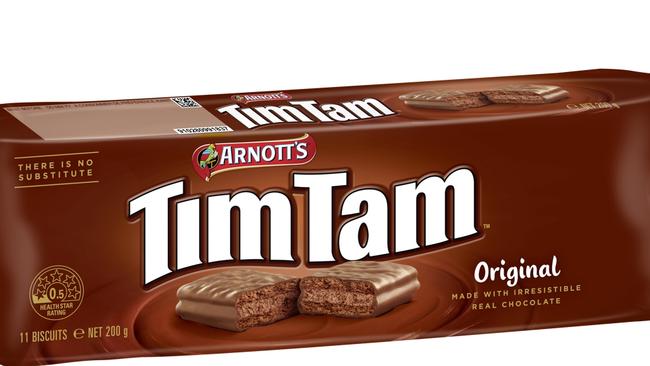
Arnott’s agreed a deal to buy the cereal and snacks operations of Freedom Foods for $20m in December and the deal is expected to complete in March.
KKR purchased Arnott’s in 2019 for $US2.2bn from Campbell Soup Company and is known to have acquisitions on its agenda, with the New Zealand rival Griffin’s Foods among its aspirational targets, according to industry sources.
Diver Foods describes itself as a manufacturer of health oriented Fast Moving Consumables Goods, currently specialising in snack foods and breakfast cereal and muesli products.
Arnott’s has also been in the mix to buy the cracker manufacturer and chilled packaged seafood distributor Gourmet Foods from CPE Capital and is expected to be among those that take a look at Quadrant Private Equity’s Darrell Lea manufacturer The RiteBite Group when it is expected to be placed up for sale later this year.
Perry Williams 11.13am: Housing market remains ‘mixed’: Boral
Boral says Australia’s housing market remains mixed due to uncertainty over government stimulus and more people moving out of cities with multi residential housing starts falling 14 per cent nationally in the first half of 2021, hit by a 26 per cent fall in the NSW market.
The construction materials giant sees little immediate pick-up in the Australian market.
“From my perspective I don’t see it rebounding in the near term,” Boral chief executive Zlatko Todorcevski said after releasing its first half results on Tuesday.
“Clearly there’s a stock of multi residential apartments that need to be worked through and we really need to see a rebound in immigration.”
The pandemic-sparked move of people out of cities into rural areas was also a factor with September quarter statistics showing the largest migration levels on record.
“We’re watching pretty closely the amount of migration in Australia out of capital cities,” Mr Todorcevski said.
Detaching housing starts were up 10 per cent in the period and Boral said it was difficult to gauge how that market will perform in the second half.
“What we can’t tell at the moment is was that outcome driven by stimulus measures like JobKeeper and HomeBuilder or is there something fundamentally happening in the market,” Mr Todorcevski said.
Boral is gaining in the morning session on the ASX, last up 0.5 per cent to $5.44.
READ MORE: Housing to be hit if borders stay shut
Joyce Moullakis 10.59am: Commodities boom boosting Macquarie: GS
Macquarie Group’s better than anticipated 2021 performance is largely driven by improved trading conditions in the commodities market, meaning consensus analyst profit estimates will rise.
That’s the view of analysts at Goldman Sachs who tip Macquarie’s guidance for annual profit to be “slightly down” implies earnings will be flat to down 5 per cent for the 12 months ended March 31.
“This compares to current GS estimates of FY21 NPAT down 23 per cent on pcp and Bloomberg consensus of FY21E NPAT down 20 per cent. The better than anticipated FY21 performance appears to be largely, albeit not entirely, driven by better than expected trading conditions within the CGM (commodities and global markets) division,” the analysts said in a note to clients.
On the outlook for the asset management and investment banking giant, chief executive Shemara Wikramanayake said: “While market conditions are likely to remain challenging, especially given the significant and unprecedented uncertainty caused by the worldwide impact of Covid-19 and the uncertain speed of the global economic recovery, making short-term forecasting extremely difficult, we currently anticipate the FY21 result to be slightly down on FY20.”
In November, Macquarie stopped short of providing annual earnings guidance as it reported a 32.4 per cent slump in interim profit for the six months ended September 30.
Shares are up by as much as 7.4pc in morning trade at $144.25.
Ben Wilmot 10.42am: Scentre signals reduced distribution
Westfield owner the Scentre Group has announced an estimated second half distribution of 7c per security in its first sign of how its pay out has been affected by the coronavirus crisis.
Scentre Group, which owns 42 malls across Australasia, will release its results for 2020 on February 24 and it also provided preliminary cashflow information.
For 2020, Scentre expects to report cash receipts of approximately $2,357m and net operating cashflow, after interest, overheads and tax of approximately $771m.
The expected cash receipts include the continued improvement in cash rental collections, with approximately $1,182m of rent collected during the second half of 2020, compared to $875m during the first half of 2020.
The group’s estimated distribution of $363m, or 7c per security, will result in approximately $408m of net operating cashflow being retained to cover operating and leasing capital and reduce net debt.
10.28am: ASX turns down after early rise
Australia’s sharemarket turned down after a slight opening gain amid strong corporate earnings reports and guidance.
The S&P/ASX 200 fell 0.2pc to 6866.9 points after rising 0.1pc to 6891 near the open.
Suncorp and James Hardie rose more than 6pc after their earnings reports but James Hardie later pared its rise to 1.4pc during its earnings call.
Macquarie surged more than 7pc after reporting that trading conditions improved in the December quarter.
Also supporting the index was a 0.9pc rise in BHP, a 2.9pc jump in Afterpay and a 1.9pc gain in Fortescue.
But most sectors were in the red, the major banks were down 0.6-1pc, CSL fell 0.9pc and Challenger dived 11pc after its earnings report.
10.12am: Suncorp well ahead of consensus: GS
Suncorp’s 1H21 cash earnings of $509m were almost 11pc above the company-compiled consensus of $460m.
Given that the result included a $36m restructuring charge which we had not anticipated, the profit from business units result was even stronger, notes Goldman Sachs analyst Ashley Dalziell.
“On balance, in light of SUN’s unstretched valuation, we expect the combination of the headline beat, continued underlying momentum, no further surprises on Business Interruption, about 55c per share of excess capital and upside risk to consensus medium term forecasts should see SUN outperform today,” he says. SUN shares rose 5.4pc to an 11-month high of $11.00 in early trading.
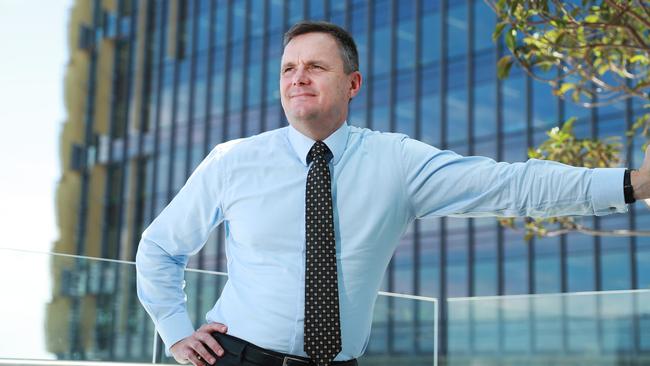
10.05am: More like 2009-10 for equities: Canaccord
Investors should be looking at 2009-10 rather than 1999-00 as the playbook, according to Canaccord.
“Many keep comparing the current environment to the 2000 ‘dot-com’ peak, but it is important to remember that current Fed policy, absolute interest rates, the yield curve, credit trends, and money availability are in a very different place than 1999-2000,” says Canaccord’s US equity strategist, Tony Dwyer. “In addition, the historically high valuations currently are on trough rather than peak EPS in 2000.”
Therefore he thinks 2021 could play out like the post-Great Financial Crisis period in 2010.
That would point to a solid year for the share market, albeit with multiple first half corrections and a valuation compression that comes from an “historic ramp” in earnings per share rather than something more onerous.
Mr Dwyer notes that since the start of US earnings season last month, Q420 year-on-year earnings have improved by 11.9 percentage points.
He notes that his is the fifth largest improvement in records dating back to Q3 2002, and it has only been matched by the 2009-10 GFC recovery.
The S&P 500 rose 0.8pc to a record high of 3910 on Monday in a six-day winning streak - the longest since August.
Lachlan Moffet Gray 9.51am: Crown Resorts in trading halt before report release
Crown Resorts has entered a trading halt ahead of the release of a NSW inquiry’s report on its suitability to operate the Crown Sydney casino at Barangaroo.
The report, which is expected to be around 800 pages long, was prepared by chair of the inquiry, former NSW Supreme Court Judge Patricia Bergin.
It will be tabled in NSW parliament at some point this afternoon.
The report is expected to allow Crown to continue operating the casino - which was prevented from opening before the report’s release - but with several mandatory caveats which may include a sell down order for major shareholder James Packer.
In a statement to the ASX, Crown said it would remain in a trading halt pending an announcement or until this Thursday.
9.45am: RBC rates James Hardie an Outperform
RBC Capital Markets is rating James Hardie Industries an Outperform after the building materials company reported FQ321 results that were above expectations and declared a special dividend.
James Hardie beat expectations with its Q321 EBITDA of $202m about 15pc above the consensus estimate of $176m and EPS of 0.28 beating by 17pc, according to RBC’s Paul Quinn.
He says the 70c special dividend and reinstatement of the ordinary dividend aren’t overly surprising given the strong operating performance and balance sheet of the company.
North America Fiber Cement Adjusted EBITDA of $177MM beat his $158MM forecast with segment revenue of $518MM compared to his $480MM forecast due to higher-than-expected average selling prices and volumes.
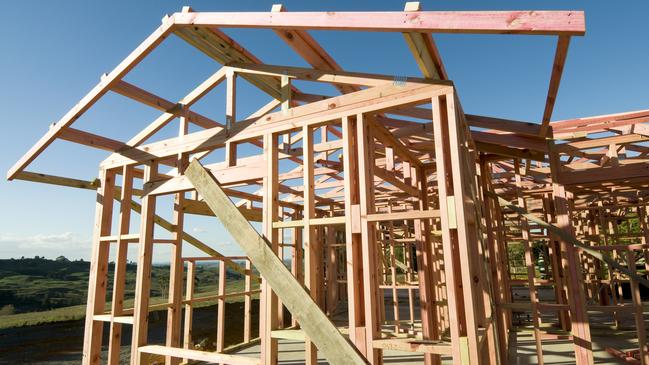
North American volumes were also strong as Exteriors rose 19pc and Interiors rose 4pc on year.
The average sales price of $740 per thousand square feet was slightly above his $730 forecast.
Results showed strong organic growth with EBIT increasing 39pc on year due to lean manufacturing savings and lower SG&A costs, partially offset by higher freight costs,” Mr Quinn says.
“The company plans to resume their ordinary dividend policy in FY2022, beginning with the first half of the year with a dividend declared in November 2021. The special dividend and reinstatement of the ordinary dividend are not overly surprising given the strong operating performance and balance sheet of the company.”
Management noted that the company continues to grow market share in both Australia and New Zealand, RBC said.
Ben Wilmot 9.37am: Dexus generates $442.9m first half profit
Office and property funds group Dexus unveiled a $442.9m first half profit and confirmed a distribution of 28.8c per security on the back of its diversified portfolio.
Dexus said the Covid-19 pandemic continued to cloud the outlook for the operating environment as a number of clusters emerged across Australia over the holiday period.
But it called out the imminent roll out of the vaccine, as well as the impact of both fiscal stimulus and historically low interest rates, as supporting economic activity, with both business and consumer confidence returning to pre-Covid levels.
Dexus chief executive Darren Steinberg said that despite the widespread impact of the pandemic, the first half had been characterised by increased leasing activity, relatively strong rent collections, growing the funds business and selling some assets.
The company said it was a strong result in the wake of the pandemic but it was down 55.5 per cent mainly due to net revaluation gains being lower than in the first half of last year.
Dexus had Adjusted Funds from Operations and a distribution of 28.8c per security, up 7.1 per cent and 6.7 per cent respectively on the previous corresponding period, primarily driven by trading profits
Rent collections were at 96 per cent for the Dexus portfolio and the Dexus Wholesale Property Fund is continuing to outperform, with the Healthcare Wholesale Property Fund well ahead.
Dexus is looking to the next office cycle and also advances plans for city-shaping projects in its $11.4bn development pipeline.
9.23am: ASX to consolidate amid earnings reports
Australia’s sharemarket looks set to consolidate on Tuesday with the focus on earnings reports.
Overnight futures relative to fair value suggest the S&P/ASX 200 index will open down 0.2pc at 6867 after rising 0.6pc on Monday.
But the S&P 500 jumped an additional 0.1pc after ASX futures closed, so the local market may be closer to unchanged.
The S&P 500 rose 0.7pc to a record high close of 3915.6, in its sixth-straight gain - the longest winning streak since August.
US news was light but the S&P 500 Energy sector rose 4.2pc as WTI crude rose 2.2pc to $US58.07 and the Financials, Tech, Industrials and Materials sectors also outperformed.
The Russell 2000 Small Caps index jumped 2.5pc and the Russell 1000 Value index rose 1.1pc while Growth rose 0.5pc.
US Treasury Secretary Janet Yellen said the US could regain full employment by 2022 if President Biden’s stimulus plan is approved versus 2025 otherwise.
BHP ADRs equivalent closed at $45.20 which was 0.8pc above BHP’s close in Sydney as iron ore rose 2.7pc and copper gained 1.6pc, while gold gained 0.9pc.
NAB’s monthly business survey is due at 11.30am AEDT and it’s a big day for earnings with reports from Suncorp, Challenger, James Hardie, Boral, Dexus and SCA Property, while Computershare reports after the close.
Macquarie says its annual profit will be “slightly down” on last year but trading conditions improved in the December quarter.
Ben Wilmot 8.50am: SCA Property lifts profit 14pc to $102.9m
Supermarket owner SCA Property has unveiled a lift in first half profit to $102.9m, up 14.1pc, and showed it is on the recovery path with higher earnings over the half.
But the results showed the toll of the crisis with Funds From Operations per unit 20.4 per cent lower than in the first half last year at 6.72c and the distribution per unit falling 24 per cent to 5.7c.
But both these metrics were higher than the previous half with FFO up 8.2 per cent and the distribution lifting by 14 per cent in the six months to the end of December in a sign the trust has rebased earnings and will look to take advantage of the boom in supermarket property.
Perry Williams 8.47am: Boral axes interim dividend as revenue falls
Construction materials giant Boral has delivered flat profit for the first half of 2021 amid patchy market conditions in NSW and Queensland, has opted not to pay a dividend and is considering the future of its $2bn US building products unit after appointing advisers.
Boral’s underlying net profit was unchanged at $156m on the same period in 2020 based on total operations but fell 14 per cent to $118m on a continuing operations basis.
The board decided not to pay an interim dividend due to net debt of $1.9bn being higher than Boral’s target of $1.5bn.
Revenue declined 9 per cent to $2.716bn due to lower volumes and pricing, especially in NSW and Queensland where major project work and multi-residential activity declined. Income at its North America unit also fell 3 per cent to $US801m with strength in building products offset by a weaker September quarter and a lower contribution from its fly ash business.
“Much work remains to be done but we are well on our way,” Boral chief executive Zlatko Todorcevski said.
Boral confirmed the appointment of an adviser, reported as Bank of America by The Australian, to advise on a potential US deal amid mounting shareholder pressure for a divestment.
The Sydney-based company said in October it would consider offloading its US building products businesses after receiving interest from suitors while also considering keeping the division depending on performance.
“In North America, business improvements have commenced, a detailed review of Fly Ash undertaken and plans to secure alternative fly ash sources are being developed. We said we would explore third-party interest in our North American Building Products assets; we have appointed advisers to support this value assessment process,” Boral said.
Shareholders including its largest investor, the Kerry Stokes-controlled Seven Group, have been pushing for it to offload its underperforming US division to unlock value for investors, particularly after it took a hefty $1.2bn writedown at its results underlining the loss of value in the business.
The company gave a mixed outlook noting while strong housing demand in North America is expected to persist, market demand in Australia remains uncertain across multiresidential and non-residential construction and due to ongoing uncertainty over the timing of major projects entering execution.
Boral does not expect earnings margins in its Australian business to grow in the second half relative to the first six months but said its North American division expects robust building products growth although fly ash faces challenges including the loss of a high margin contract in October.
Joyce Moullakis 8.38am: Macquarie flags profit hit
Macquarie Group has flagged its annual profit will be “slightly down” on last year, despite improved trading conditions in the December quarter.
Documents released ahead of an annual operational briefing on Tuesday, also announced the departure of two key Macquarie executives. The head of Macquarie’s asset management unit, its biggest division, Martin Stanley will step down in April to be replaced by Ben Way, while Macquarie Bank boss Mary Reemst will retire in July.

Subject to regulatory approvals, Stuart Green will take over from Ms Reemst.
On the outlook for the asset management and investment banking giant, chief executive Shemara Wikramanayake said: “While market conditions are likely to remain challenging, especially given the significant and unprecedented uncertainty caused by the worldwide impact of Covid-19 and the uncertain speed of the global economic recovery, making short-term forecasting extremely difficult, we currently anticipate the FY21 result to be slightly down on FY20.”
In November, Macquarie stopped short of providing annual earnings guidance as it reported a 32.4 per cent slump in interim profit for the six months ended September 30.
Lachlan Moffet Gray 8.33am: James Hardie declares special dividend
James Hardie Industries has declared a special dividend of 70c a share and said it intends to reinstate its ordinary dividend in the next financial year.
It comes as its third quarter adjusted net profit after tax increased 59 per cent year on year to $US123.3m.
The first regular dividend will be paid in November this year.
The building materials supplier also raised its full year guidance to $US440m-450m, up from $US380m-US$420m.
The special dividend will be payable on April 30.
Lachlan Moffet Gray 8.29am: Challenger slashes dividend as profit drops
Challenger Limited has seen its normalised half year net profit after tax fall 28.5 per cent to $136.8m and almost halved its interim dividend.
The investment manager declared a dividend of $0.095 per share, down from $0.175 a share last year.
The dividend slash comes as group net income/profit for the period attributed to equity holders ticked up by 1.1 per cent year on year to $222.8m for the half.
8.26am: What’s impressing analysts today
- ASX raised to Neutral: JPM
- Cochlear raised to Neutral: JPM
- Harvey Norman cut to Neutral: JPMorgan
- GPS Group started at Buy: Bell Potter
- Pilbara Minerals cut to Neutral: CS
- Vocus cut to Neutral: GS
Cliona O’Dowd 8.22am: Suncorp says outlook ‘uncertain’
Suncorp has cautioned on the uncertain outlook ahead as it unveiled its first-half result showing higher earnings across all business lines pushed its cash profit up 39.5 per cent to $509m for the six months through December.
Its net profit after tax, meanwhile, dropped 23.7 per cent to $490m, with the prior corresponding period benefiting from a $293m gain on the sale of its smash repairer and automotive parts supplier in October 2019.
CEO Steve Johnston said the first-half numbers showed that Suncorp’s focus on its core businesses and digitisation was yielding positive results.
“Over the past year, we have refocused our strategy, continued to implement the ongoing regulatory program of work, improved our customer service, reinvigorated our brands, further digitised our business and become more efficient,” Mr Johnston said.
“I am proud of how the group has delivered on these commitments and been true to our purpose in a challenging year,” he said.
Its insurance Australia arm saw strong growth in the consumer portfolio, alongside higher investment returns and prior period reserve releases. The division’s profit after tax for the half jumped 109.8 per cent on the prior corresponding period to $258m.
Investment income of $305m was up 124 per cent on the prior year, it said.
As insurer’s brace for a potential flood of business interruption claims stemming from the coronavirus pandemic, Suncorp increased its provisioning by a further $19m to $214m.
This “prudent approach” reflected the finalisation of interim reserve valuations and included an allowance for the possibility of further legal costs, Suncorp said.
Profit after tax in its banking and wealth arm rose 11 per cent to $190m, with an 8 basis point improvement in net interest margin over the period to 2.04 per cent.
Its home lending portfolio contracted by 1.6 per cent over the half, while business lending grew 0.7 per cent.
8.19am: US stocks close at records
Stocks closed at new highs as investors wagered that a new round of stimulus spending would bolster the economy.
The S&P 500 gained 0.7pc, continuing to advance after the broadbased index posted its biggest one-week advance since November and closed Friday at an all-time high.
The technology-heavy Nasdaq Composite advanced nearly 1pc, while the Dow Jones Industrial Average climbed 0.8pc. All three indexes finished at records.
Stocks have powered higher in recent trading sessions, putting the volatility sparked by swings in GameStop and other individual stocks in the rearview mirror. Investors are focusing on the prospect for a new batch of government spending. They say that could boost growth at a time when large companies are reporting robust profits but the broader economic outlook is patchy.
Democrats took a series of votes last week unlocking a process called reconciliation, which will allow the party to approve President Biden’s $1.9 trillion relief plan without Republican support in the Senate. House lawmakers are aiming to finalise and vote on a relief bill before the end of February.
The combination of strong quarterly earnings reports from some of the biggest U.S. companies and the possibility of more relief for the economy has given markets a shot in the arm, according to Daniel Morris, chief market strategist at BNP Paribas Asset Management.
Markets also have been buoyed by an upbeat set of earnings for the holiday quarter from large U.S. companies. Of the 295 companies on the S&P 500 that had reported by early Monday, 81% had beaten analysts’ expectations for earnings growth, according to FactSet.
Oil markets continued to rally, pushing Brent-crude futures above $60 a barrel for the first time since the start of the pandemic in January 2020. The international energy benchmark was up 1.6% in recent trading.
The oil rally helped make energy stocks the best-performing sector of the S&P 500. Overall, seven of the index’s 11 sectors were in positive territory on Monday, including materials and financials.
Overseas, the Stoxx Europe 600 rose 0.3%. In Asia, the Shanghai Composite Index gained 1%. The Nikkei 225 advanced 2.1% after Nikkei Asia reported that Japan will consider lifting a coronavirus state of emergency in some prefectures ahead of a new deadline.
Dow Jones Newswires
8.01am: Suncorp boosts earnings by 40pc
Insurer Suncorp has posted a 40 per cent rise in first half cash earnings to $509m, driven by higher earnings across all businesses.
Group net profit after tax fell 23.7 per cent to $490m and first half revenue was up 4.2pc on year at $7.35bn.
Suncorp declared a dividend of 26c a share.
Suncorp Group CEO Steve Johnston said the result demonstrated that a focus on the core businesses and digitisation was yielding positive results.
“Over the past year, we have refocused our strategy, continued to implement the ongoing regulatory program of work, improved our customer service, reinvigorated our brands, further digitised our business and become more efficient,” Mr Johnston said.
7.15am: ASX to dip at open, despite US gains
Australian stocks are poised to edge lower in early trade, even as Wall Street hit record highs.
At about 7am (AEDT) the SPI futures index was down 18 points, or 0.3 per cent.
Wall Street rose further in US afternoon trade, with the Dow up 0.5 per cent, the S&P 500 rising 0.45 per cent and the Nasdaq gaining 0.6 per cent.
Yesterday, the ASX closed up 0.6 per cent.
The Australian dollar is higher at US76.97c.
Spot iron ore is up 2.5 per cent to $US159.80 a tonne, Brent oil rose 2.1 per cent to $US60.56 a barrel.
Gold futures are up 1.2 per cent to $US1834.20 an ounce.
6.55am: Air NZ reviews contracting: report
An Air New Zealand maintenance unit is reviewing its contracting processes after its work for Saudi Arabia’s navy drew criticism, 1 News reports.
The Gas Turbines unit, which services military marine engines and turbines, worked on Saudi navy vessels through a third-party contract, the report said.
The commercial relationship was problematic because Saudi Arabia’s blockade of Yemen has caused a humanitarian crisis, the report said.
Dow Jones Newswires
6.50am: Brent tops $US60 for first time in over year
Oil futures climbed, with global benchmark Brent crude settling above $60 a barrel for the first time since January of last year.
Prices got a boost as hope for a recovery in the economy in the midst of the COVID-19 vaccine rollout and expectations for the passage of the latest U.S. stimulus package lifted prospects for energy demand.
April Brent crude added $1.22, or 2.1pc, to settle at $US60.56 a barrel on ICE Futures Europe, the first front-month contract finish above $US60 since January 24, 2020, according to Dow Jones Market Data. March West Texas Intermediate crude rose $1.12, or 2 per cent, to settle at $US57.97 a barrel on the New York Mercantile Exchange, also the highest finish since January of last year.
Dow Jones
6.20am: SoftBank turns $USbn profit
SoftBank Group Corp.’s massive tech funds are finally starting to produce golden eggs. That is how Masayoshi Son, SoftBank’s ebullient chief executive, characterised a record-breaking quarter for the Japanese company’s signature $US100 billion Vision Fund.
That fund, along with a smaller successor, rode red-hot markets to investment gains of $US13 billion in the three months ending December, their best quarter ever. Those gains underpinned a net profit of Yen1.17 trillion for SoftBank, equivalent to about $US11 billion.
Mr. Son said he expected SoftBank’s funds -- which have investments in 164 companies when a third capital pool focused on Latin America is included -- could produce between 10 and 20 initial public offerings a year.
“We’ve finally entered the harvest phase,” for the funds, Mr. Son said at a Tokyo news conference, standing in front of a slide showing a goose laying golden eggs, representing SoftBank’s hit IPOs and exits. A later slide depicted the golden eggs marching out of the goose to the tune of Tchaikovsky’s “March of the Toy Soldiers.”
A successful run could revive the reputation of Vision Fund, after missteps and a market tumble early in the pandemic left it with a nearly $US17 billion investment loss in the year ended March. Good returns are critical for Mr. Son, who hopes to roll out a series of successor funds, but has found investors too sceptical of the first fund’s performance to contribute to a second.
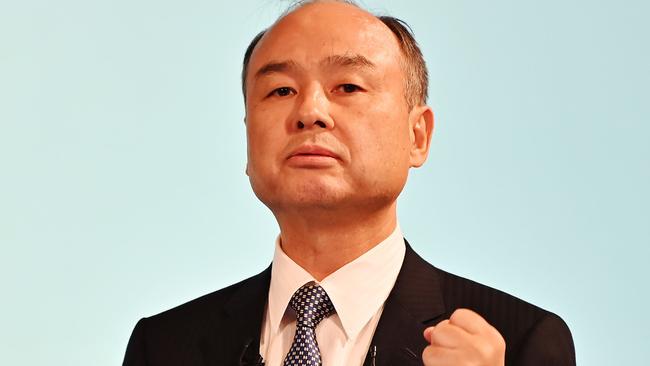
Dow Jones
5.07am: Wall Street on course to extend win streak
Stocks rose toward fresh records as investors wagered that a new round of stimulus spending would bolster the economy.
The S&P 500 gained 0.3pc in early afternoon trading, continuing to advance after the broadbased index posted its biggest one-week advance since November and closed Friday at an all-time high.
The technology-heavy Nasdaq Composite gained 0.5 per cent and the Dow Jones Industrial Average climbed 0.4 per cent. All three indexes are on track to close at records.
Stocks have powered higher in recent trading sessions, putting the volatility sparked by swings in GameStop and other individual stocks in the rearview mirror. Investors are focusing on the prospect for a new batch of government spending. They say that could boost growth at a time when large companies are reporting robust profits but the broader economic outlook is patchy.
Democrats took a series of votes last week unlocking a process called reconciliation, which will allow the party to approve President Biden’s $US1.9 trillion relief plan without Republican support in the Senate. House lawmakers are aiming to finalise and vote on a relief bill before the end of February.
The combination of strong quarterly earnings reports from some of the biggest American companies and the possibility of more relief for the economy has given markets a shot in the arm, according to Daniel Morris, chief market strategist at BNP Paribas Asset Management.
“It’s like your birthday and Christmas on the same day, and the markets are all happy,” said Mr. Morris.
Another round of stimulus spending in the US, a net importer, would also be a boon for overseas stock markets, according to Mr. Morris. “If you’ve got your growth motors of growth in the U.S. and China doing very well this year, that helps everyone,” he said.
Markets have also been buoyed by an upbeat set of earnings for the holiday quarter from large US companies. Of the 295 companies on the S&P 500 that had reported by early Monday, 81 per cent had beaten analysts’ expectations for earnings growth, according to FactSet.
Oil markets continued to rally, pushing Brent-crude futures above $US60 a barrel for the first time since the start of the pandemic in January 2020. The international energy benchmark was up 1.6 per cent in recent trading.
The oil rally helped make energy stocks the best-performing sector of the S&P 500. Overall, seven of the index’s 11 sectors were in positive territory on Monday, including materials and financials.
The market is in the midst of a broad “reflation trade” that’s fuelling gains in sectors that were beaten down by last year’s coronavirus slowdown, as well as small-cap stocks and emerging markets, said Paul Christopher, head of global market strategy at the Wells Fargo Investment Institute.
Bitcoin jumped to more than $US43,000, a gain of 15pc over the past 24 hours, according to CoinDesk, after Tesla said it had invested $US1.5 billion in the digital currency. The electric-vehicle maker said in a filing that it expects to begin accepting bitcoin as a form of payment soon. Tesla shares gained 1.5pc.
In Asia, the Shanghai Composite Index ended 1pc higher. The Nikkei 225 rose 2.1pc after Nikkei Asia reported that Japan will consider lifting a coronavirus state of emergency in some prefectures ahead of a new deadline.
Dow Jones Newswires
5.05am: DoorDash buying robotics start-up Chowbotics
DoorDash Inc. is acquiring robotics start-up Chowbotics, according to people familiar with the deal, signalling a growing appetite to automate food production when ordering in is at an all-time high.
The companies aren’t planning to disclose the terms of the deal, one of the people said.
Chowbotics’ technology can whip up salads and poke bowls, among other things, and DoorDash is exploring how to deploy it across restaurants, one of the people said. Some of the ideas include using the technology to help restaurants expand their menu -- such as enabling a pizzeria to offer salads, for example -- or letting a salad bar open new locations -- a kiosk at an airport, for instance -- without additional manpower.
While automating food production could shave off time and costs for restaurants, it’s unclear how amenable potential diners are to these technologies.
Uber Technologies Inc. invested in building delivery drones for its Eats business, but dialled back those ambitions amid a broad restructuring last year.
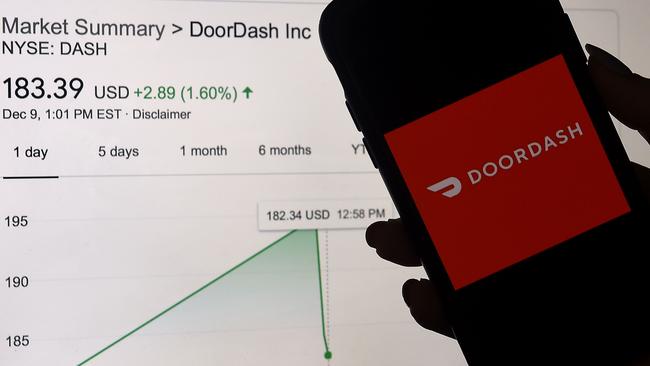
Dow Jones
5.00am: Brent tops $US60, Tesla supercharges bitcoin
Bitcoin hit a record-high near $US45,000 after Elon Musk’s electric carmaker Tesla invested $US1.5 billion in the digital currency and said it would soon accept it as payment.
Meanwhile, the benchmark oil contract Brent North Sea rose above $US60 per barrel to hit the highest level since the coronavirus pandemic began to spread globally almost a year ago.
Shortly after news broke of Tesla’s investment bitcoin hit $US44,795.20 before pulling back slightly.
The cryptocurrency is up by around 50 per cent since the start of the year. “This is probably one of the biggest developments for the cryptocurrency industry,” noted Fawad Razaqzada, analyst at ThinkMarkets.
“Tesla is going to be a major player in the auto industry and if it starts accepting bitcoin as a form of payment, it will give the digital currency further legitimacy.”
The climb in Brent above $US60 has come owing to the OPEC oil cartel and its allies cutting output after the coronavirus pandemic slashed demand, according to analysts.
“It is worth reminding oneself that OPEC+ is the single most important reason for why the oil price reached $US60”, noted Bjarne Schieldrop, chief commodities analyst at SEB Research.
“It is because of large cuts by OPEC+... since May,” he added. Brent crude hit $60.40 per barrel on Monday, the first time it has exceeded $US60 since February 2020.
European and Asian stock markets climbed, and Wall Street was higher in midday trading.
“Stock markets are showing modest gains this afternoon as dealers are hopeful the Biden administration will sign off on the $US1.9 trillion relief package as a way of stimulating the US economy,” said market analyst David Madden at CMC Markets UK.
Adding to the upbeat mood is data showing new Covid infection rates, with last week seeing the lowest level since October, while governments begin to get to grips with inoculation programs.
London closed up 0.5 per cent, Frankfurt added less than 0.1 per cent and Paris gained 0.5 per cent.
AFP
4.58am: Chinese regulators summon Tesla over car security malfunction
Chinese regulators have summoned representatives of US electric car giant Tesla after reported technical problems with their cars, notably concerning their safety, officials in Beijing said Monday.
The news comes several months after two recalls of the company’s vehicle in China, the world’s largest car market.
“Consumers have cited multiple problems, related to unusual accelerations, batteries catching fire, as well as with the remote update system,” the State Administration for Market Regulation said in a statement.
“They were asked to strictly conform to Chinese laws and regulations” in order to “guarantee public security” and the “rights and legitimate interests of consumers”, the regulator said in its statement.
No further details were given about the reported malfunctions. Tesla built its third factory in the coastal city of Shanghai in 2019, with the electric car giant seeking to take advantage of China’s ambitious objectives in terms of reducing CO2 emissions.
AFP
4.55am: BP enters UK offshore wind sector
British energy major BP entered the UK offshore wind sector alongside German peer EnBW, after authorities awarded rights to build wind farms to help cut carbon emissions.
The oil giant and German power firm Energie Baden-Wuerttemberg AG (EnBW) have been selected as preferred bidder for two 60-year leases in the North Sea.
“This marks BP’s entry to the UK’s offshore wind power sector, currently the largest in the world, and is further progress towards BP rapidly building a world-class wind energy business,” a statement said.
“Once operational, this generating capacity would be sufficient to power more than 3.4 million UK households with clean electricity.” BP itself is targeting “net zero” carbon emissions by 2050 as part of broader plans to offset declining oil and gas production with greater output from sustainable energy sources, such as electricity and wind.
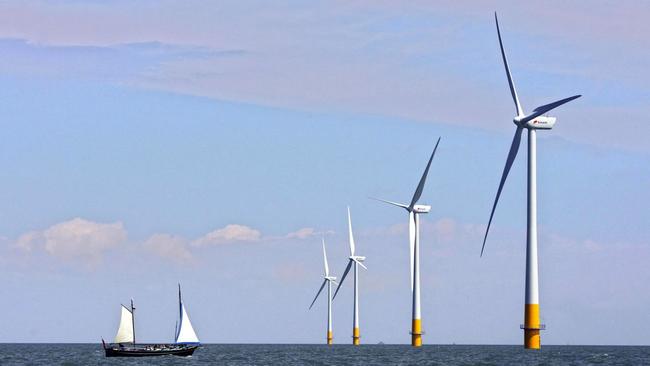
AFP
4.50am: Bitcoin hits record after Tesla investment
Bitcoin hit a record-high near $US45,000 after Elon Musk’s electric carmaker Tesla invested $US1.5 billion in the digital currency.
Bitcoin hit $US44,795.20, before cooling slightly to $US44,207.95. The cryptocurrency is up by around 50 per cent since the start of the year. “This is probably one of the biggest developments for the cryptocurrency industry,” noted Fawad Razaqzada, analyst at ThinkMarkets.
“Tesla is going to be a major player in the auto industry and if it starts accepting bitcoin as a form of payment, it will give the digital currency further legitimacy.” Tesla’s announcement, in a US Securities and Exchange Commission document, is a sign of confidence in the cryptocurrency that regulators are concerned could be used for illegal transactions.
“As more and more companies start accepting bitcoin, this will only lead to further increases in demand in a market which is limited in supply,” Razaqzada added.
“Therefore, the long-term outlook on bitcoin remains bullish even if it is starting to look quite expensive in fiat currency terms.”
Tesla’s move comes after CEO Musk last week changed his Twitter bio to read simply “#bitcoin”.
Just 12 years old, bitcoin has seen a meteoric rise since March, when it stood at $US5000, spurred by online payments giant PayPal saying it would enable account holders to use cryptocurrency.
Tesla’s move is “the kind of backing that can take bitcoin through $50,000”, remarked Neil Wilson, chief market analyst at Markets.com.
It nonetheless raises “questions for fund managers who may not want to invest in a company with this kind of risk on its balance sheet -- we know bitcoin is very volatile”, he added.

AFP
4.45am: Another 2450 jobs axed as Boohoo buys Arcadia brands
British online clothing retailer Boohoo bought the remaining fashion brands belonging to Arcadia -- the collapsed bricks-and-mortar business that had struggled long before the COVID-19 pandemic forced shoppers online.
Boohoo however rejected the chance to take on stores attached to brands Burton, Wallis and Dorothy Perkins, resulting in around 2450 job losses.
The announcement from administrator Deloitte completes the sale of Arcadia’s brands, including Topshop, and means that almost 5000 jobs at the group have been shed over the last week.
About 13,000 jobs in total are being lost owing to Arcadia’s collapse in December, marking the spectacular collapse of the sprawling retail empire. Those jobs have either been made redundant since administration, or are now at risk of being lost, according to a source close to the matter.
Deloitte, in charge of winding down the once-mighty high street giant owned by British tycoon Philip Green, said Boohoo is paying £25.2 million ($US34.6m) for the three brands.
The news comes after Boohoo-rival ASOS last week purchased Arcadia brands Topshop, Topman, Miss Selfridge and HIIT in a deal worth £330 million. ASOS dropped the 70 stores that are attached to those brands, resulting in around 2,500 job losses.
AFP

